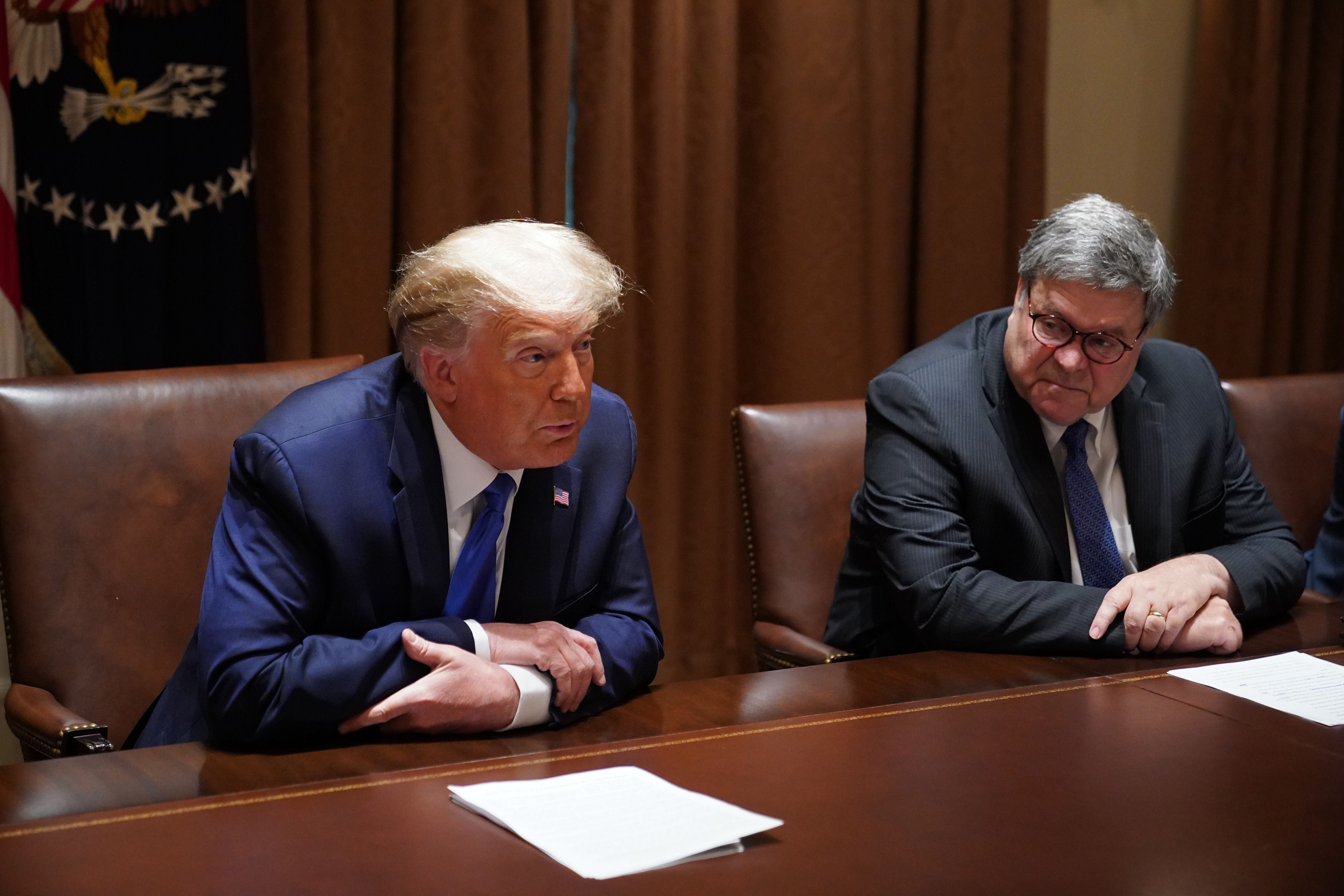Why aren’t more Republicans attacking Trump like Bill Barr?
What a sign of the GOP’s moral collapse


Your support helps us to tell the story
From reproductive rights to climate change to Big Tech, The Independent is on the ground when the story is developing. Whether it's investigating the financials of Elon Musk's pro-Trump PAC or producing our latest documentary, 'The A Word', which shines a light on the American women fighting for reproductive rights, we know how important it is to parse out the facts from the messaging.
At such a critical moment in US history, we need reporters on the ground. Your donation allows us to keep sending journalists to speak to both sides of the story.
The Independent is trusted by Americans across the entire political spectrum. And unlike many other quality news outlets, we choose not to lock Americans out of our reporting and analysis with paywalls. We believe quality journalism should be available to everyone, paid for by those who can afford it.
Your support makes all the difference.“The fact is, [former president Donald Trump] is a consummate narcissist...He will always put his own interests and gratifying his own ego ahead of the country’s interests.”
Reading that comment initially, you’d assume it was made by a Democrat. But in fact the speaker there is Bill Barr, Trump’s own former Attorney General, who roasted Trump on CBS’ Face the Nation this weekend. Barr also explicitly pushed back against Republican claims that the prosecution of Trump was unfair or politically motivated. “This is not a circumstance where he’s the victim or this is government overreach,” he said. “He provoked this whole problem himself.”
Certain Democrats expressed their astonishment at Barr’s condemnation of his former boss. On social media you could see the former AG being praised for his forthrightness, or condemned as a hypocrite – sometimes both.
Barr’s flip isn’t really that surprising though, if you recognize that he’s a committed partisan with few principles and a singular goal to advance the Republican party agenda. What is unusual is that, despite Trump’s obvious threat to the GOP, few in the party seem willing to take him on.
Trump hired Barr because he felt he could count on Barr’s loyalty. Trump’s previous attorney general, Jeff Sessions, was an extremely conservative Republican and enthusiastic Trump supporter himself. But Sessions, under pressure, had appointed special prosecutor Robert Mueller to investigate whether Trump’s 2016 campaign had solicited or received aid from Russia. Trump fired Sessions in 2018, in a move widely seen as an effort to interfere with the investigation.
Barr was brought on because Trump thought he would be even more cravenly loyal than Sessions. And sure enough, when the Mueller report was released, Barr made “misleading public statements” to spin its findings in favor of Trump, according to a federal judge, and wrongly withheld part of the report injurious to Trump.
Barr now says Trump puts his own interests above those of the country. But while AG, Barr fought to mislead the country about the extent to which Trump had entangled himself with an inimical foreign power in order to win the presidency.
The about face is dramatic – but is also readily explicable. During the Trump presidency, as the face of the Republican party damage to him was likely damage to the GOP as a whole. A scandal for a Republican president means the GOP fares worse in elections. It means that the president has more trouble pushing through his agenda. Barr wasn’t defending Trump as a personal favor to Trump, he was defending Trump out of personal loyalty to the Republican party – a loyalty that superseded Barr’s loyalty to the country.
Once Donald Trump left office, though, Barr’s incentives changed. Trump is no longer the formal leader of the GOP. He currently holds no elected office. Yes, Trump is running for president, but so are a lot of other Republicans. Trump’s numerous scandals – the investigation of hush money payments in the 2016 election, the civil judgement against him for sexual assault and defamation, the investigation of egregious mishandling of classified documents – those are now all Trump’s problems. The GOP can disavow them by the simple expedient of nominating someone else to run in 2024.
Barr has set himself the task of making sure the party chooses a less damaged candidate. It’s telling that in the Face the Nation interview, Barr is most passionate when talking about how Trump endangers Republicans in particular. “He constantly engages in behavior that puts his political followers at risk and the conservative and Republican agenda at risk,” he says. When Robert Costa pushes him to say that Trump will put the country at risk, Barr waffles. He won’t say Trump will put the country at risk, only that Trump puts his personal interests above those of the country. Barr no doubt wants wiggle room if Trump is in fact the nominee.
And Trump may well be; he remains in the lead in most GOP primary polls. GOP voters invested a great deal of energy in defending and celebrating Trump when he was president. It’s hard to turn that kind of partisan momentum around. Moreover, by lying about the 2020 election, Trump convinced many Republican voters that he was robbed of the presidency; a majority of the GOP base sees him as the rightful president.
That puts GOP leaders in a bind. Trump, indicted on dozens of counts and facing high profile trials, is a huge risk in a general election. But his opponents in the party are afraid to alienate his followers. As a result, 2024 opponents like Florida Governor Ron DeSantis and former Vice President Mike Pence go back and forth about whether or how to criticize Trump. Sometimes they half acknowledge that keeping classified documents in your bathroom is bad. Sometimes they insist that the Justice Department is persecuting Trump unfairly.
As Barr has figured out, the partisan incentives here should be to jettison Trump. But Trump has leveraged the GOP’s growing authoritarianism and turned its partisanship into a personality cult. Barr isn’t running for office, but GOP politicians attempting to win the presidency are terrified of alienating Trump’s base, even as they worry that another Trump run for presidency will end in disaster. It’s a measure of the party’s moral collapse that, in the current climate, a soulless partisan hack like Bill Barr can be mistaken for a profile in courage.




Join our commenting forum
Join thought-provoking conversations, follow other Independent readers and see their replies
Comments